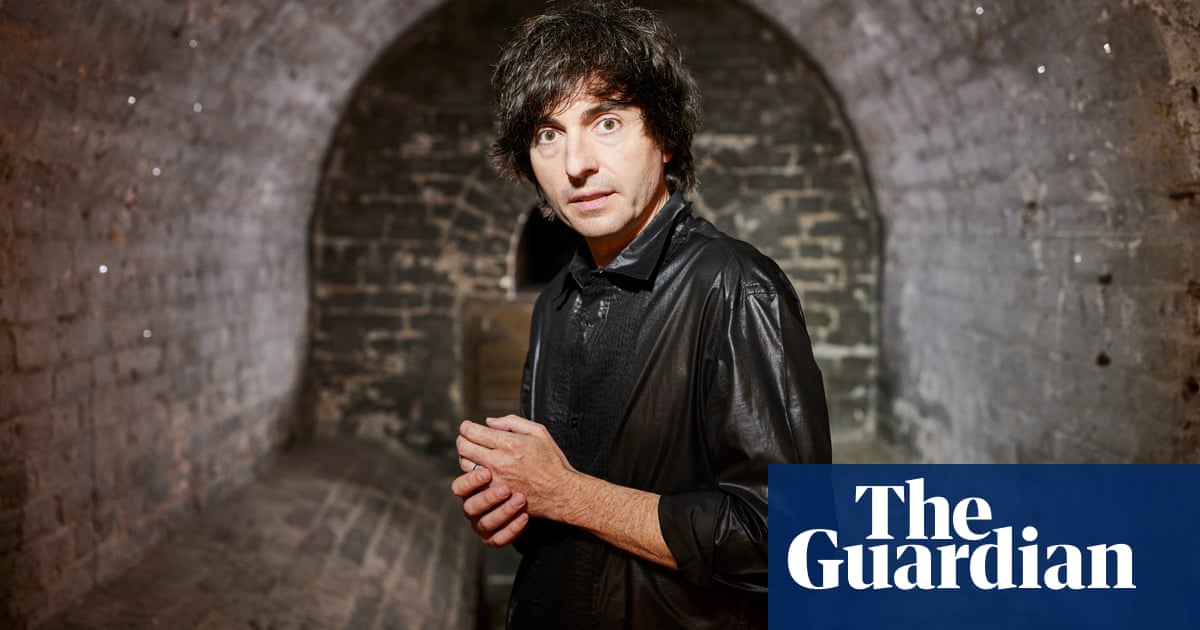
At a 40,000-strong rally in Trafalgar Square in London in July, the far-right activist Tommy Robinson was characteristically defiant. “Death, prison or glory, we will never submit to your lies,” he declared. “They want to send me to jail [but] the world will know I told the truth.”
On Monday, Robinson was duly sentenced to 18 months in prison for contempt of court. He had shown no remorse and there was no realistic prospect of rehabilitation, said Mr Justice Johnson at Woolwich crown court. “All of his actions so far suggest that he regards himself as above the law.”
In the dock, Robinson pumped his chest and saluted his loyal supporters in the public gallery. They blew kisses back. He was taken to Belmarsh high-security prison in south-east London.
The jailing of Robinson is the latest episode in his apparently inexorable rise from the owner of a tanning salon in Luton, Bedfordshire, to the brash pin-up hero of the far right in the UK, the US and beyond. He is, arguably, the most potent individual to have emerged on the British far right since Enoch Powell.
Along the way, he has served four jail terms, and has now begun his fifth. None appear to have led him to reflect on and reconsider his actions; indeed, they have reinforced his image as a political martyr to the cause of rightwing extremism.
Robinson is a complex and often contradictory figure, but “we should not underestimate him”, said Nick Lowles, the chief executive of the anti-racism campaign group Hope not Hate, who has watched him closely for years.
He is “massively charismatic” with “enormous reach”, said Lowles. “He has an ability to bring huge crowds together on a level that we haven’t seen previously. His videos are watched in the millions.”
It was easy to see why Robinson, 41, had emerged as a high-profile leader of the far right, said Lowles. “Firstly, he is charismatic and instils a sense of loyalty and following. Secondly, he is willing to get stuck in. He’s willing to go to prison, and he’s the first one in a fight.
“When someone crosses him, he acts like a gangster. He sends threatening voice notes to people. And he doesn’t hold back. Things like: ‘If you do X, I’m going to come around to your house and smash your fucking face in.’”
Born Stephen Yaxley in 1982 in Luton to an Irish mother and English father, he was first jailed in his early 20s for assaulting an off-duty police officer. After his release, he and his cousin Kevin Carroll founded the English Defence League (EDL) organisation “against the rise of radical Islam”. They initially recruited members among local football fans. According to Robinson’s self-published autobiography, it was the beginning of “years of mad laughs with the lads”.
As media attention grew, he cast around for a pseudonym. Taking the name of a fellow Luton Town FC supporter, “Tommy Robinson” stepped on to the public stage.
Robinson and the EDL focused on what they claimed was an Islamic threat. The chant of “Muslim bombers off our streets” was heard at rallies and protests. Robinson asserted that Muslims would outnumber “Europeans” within a few decades.
Lucy Brown, a journalist who worked with Robinson a few years ago before falling out with him, said he did not fit most people’s definition of a racist. “He doesn’t like people talking about skin colour. But Islam, and the position he has taken is definitely his thing. It’s his brand.”
Later, after serving a prison sentence for using another man’s passport to travel to the US, Robinson announced he had parted company with the EDL. At a press conference, he acknowledged the “dangers of far-right extremism” and the “need to counter Islamist ideology not with violence but with better, democratic ideas”.
Nevertheless, he continued to use multiple social media platforms to galvanise his supporters. His posts not only whipped up anti-Muslim hatred and brought increasing numbers on to the streets, they also generated hard cash in response to appeals for donations. The Tommy Robinson brand was becoming a lucrative earner.
In 2018, Robinson was banned from Twitter for breaching its rules on “hateful conduct”, and his accounts on Facebook and Instagram were suspended the following year for repeatedly breaking rules on hate speech. But by 2023, Elon Musk, Twitter’s new owner, reinstated Robinson’s account. He now has 1 million followers.
He also began to win supporters abroad, principally among rightwingers and wealthy backers in the US and Canada. “He has found a way to make hate pay,” said Lowles. “He has monetised hate in a way that no one else has done.”
Lowles added: “He talks about building a movement, but it’s all about Tommy. He’s built a multimillion-pound empire … He rakes in huge amounts of money. He’s been talking about this great movement for a while, but really the movement is him.”
Robinson’s latest platform is Urban Scoop, which claims to champion independent journalism and “genuine, unbiased and corporate-free content”. Echoing Donald Trump’s lucrative Truth Social platform, Urban Scoop claims to “work tirelessly to fortify and reunite our nation” and provide “the truth beyond mainstream media”. Supporters are invited to make donations, including through various crypto currencies, and buy merchandise.
Hope Not Hate has called for Robinson’s finances to be investigated by the authorities. The advocacy group says that although Robinson declared himself bankrupt in 2021, he continued to enjoy a lavish lifestyle and squander “vast sums on gambling, drinking and partying … expensive villas and top-end hotels”.
A stark illustration of this came a few months ago when Robinson helped to foment riots on the streets of the UK from a five-star hotel in Cyprus. The unrest followed the killing of three young girls at a dance class in Southport.
Having failed to appear at a court hearing in London, Robinson took his family on holiday where he used social media to disseminate disinformation about the Southport attack and called on his supporters to “rise up”. Violent disorder spread across more than two dozen towns and cities, with some of those involved chanting “Tommy Robinson” as they threw bricks, started fires and assaulted police officers.
For more than a week, the UK was in the grip of the unrest. Keir Starmer, the new prime minister, cancelled his summer holiday as Robinson operated from his sun lounger with apparent impunity.
Another rightwing populist leader was accused of irresponsible and dangerous behaviour over the riots. Nigel Farage, newly elected as an MP, was described as “nothing better than a Tommy Robinson in a suit” by Brendan Cox, the husband of the murdered MP Jo Cox.
Farage swiftly distanced himself from “violence and thuggery”. In a video post on X, he said: “As for the Tommy Robinsons and those that genuinely do stir up hatred, well I’ve never had anything to do with them.”
But with Robinson and Farage fishing in a similar pool of support, there is little doubt Robinson exerts pressure from the right on Farage and his party, Reform UK (which in turn exerts pressure on the Conservative party, which lost power this year). “Robinson has an appeal which isn’t much smaller than Farage’s,” said Lowles. On top of that, he added, polling showed Robinson enjoyed name recognition among the British public that was greater than many current frontline politicians.
At the Trafalgar Square rally in July, Robinson asked the huge crowd if anyone had voted Labour in the general election a couple of weeks earlier. The question was met with boos. When he asked if anyone had voted for Farage’s party, the crowd erupted in cheers.
But Robinson’s supporters are mostly not interested in elections and political parties. The movement that has no name and no structure is now part of a “post-organisational” far right, the creation of a shrewd influencer and a social media revolution.
And it is a movement that appears to be growing. The size of the Trafalgar Square crowd took many Robinson-watchers by surprise. Last weekend, up to 20,000 also joined a “Uniting the Kingdom” protest march in London. New cohorts of followers – including more women – appear to be drawn to Robinson, who has sought at intervals to opportunistically broaden his political message beyond anti-Islam.
He has promoted debunked conspiracy theories about the Covid vaccine and, in more recent times, taken a socially conservative pivot by using language about Christianity. “Christ is King” has become a new chant at his rallies.
The prison sentence handed to Robinson earlier this week followed his admission of contempt of court by repeating false allegations against a Syrian refugee, including posting on social media a libellous film called Silenced, which has had 55m views.
On being told his sentence could be reduced by four months if he removed the film, Robinson shook his head and appeared to say “nah”.
He is likely to serve nine months of his 18-month sentence. Since being jailed, Robinson has been denied direct access to social media. Prisoners have access to the internet only in a supervised environment, and only for rehabilitative purposes.
Imprisonment is unlikely to result in Robinson being silenced. His social media accounts have carried “admin posts” in the past few days, including a message of thanks from Robinson to “everyone who has sent him money for prison spends, also for money towards his legal representation, he is incredibly grateful for your support”.
Ezra Levant, the Canadian founder of Rebel News, a rightwing website with wealthy backers, has promised to visit Robinson regularly in prison, and report back. He told readers: “If they can jail Tommy Robinson, they can jail you, too.”
Robinson’s supporters are expected to organise “Free Tommy” rallies in the coming months. A win for Trump in the upcoming US presidential election may also open unknown doors, especially as the longtime Trump acolyte Steve Bannon, a known admirer of Robinson’s, was released from prison this week.
Robinson presents a problem for the prison service. “The decisions around how and where Robinson will be held are fraught with difficulty for prison bosses,” said Ian Acheson, a counter-extremism adviser and former prison governor.
Robinson’s supporters report that he is being held in a segregated unit in Belmarsh prison for his own safety. They claim he is at risk of attack from Muslim prisoners.
Acheson warned that attempts were being made to propagandise his imprisonment, and misinformation about his treatment was already spreading on social media. The Tommy Robinson propaganda machine seems unlikely to go away.












